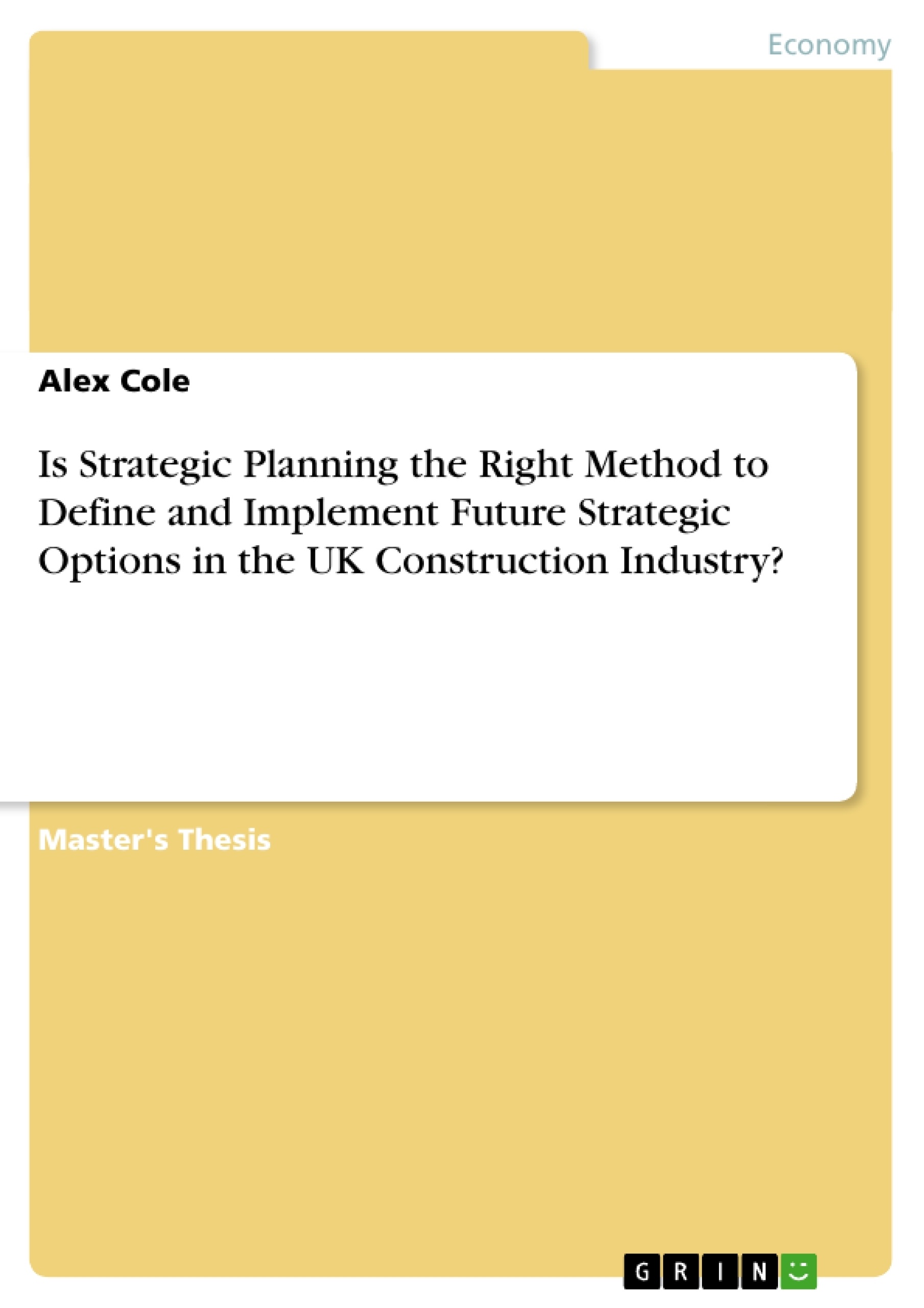In the management of any business and industry the function of strategic planning plays a key role that gives direction for future and assists in identifying the organisations competitiveness. Evidences suggests that construction companies are not putting enough efforts and are not emphasizing enough on strategic planning in comparison with their counterparts in other industries. The paper gives a platform for an enhanced framework for practices of strategic planning for construction companies in UK. The analysis of strategic planning as right method for defining and implementing future strategic options for the UK construction industry is proposed from the current practices in the industry and online available literature on the topic. The paper highlights related external factors and scenarios of the industry, considers the engagement of the stakeholder during the process, and helps to analyse the overall effectiveness of the strategic planning. The paper should help companies in construction industry of UK to plan and implement their future strategic options in a better way and thus improve their practices.
Inhaltsverzeichnis (Table of Contents)
- Introduction
- Strategic Planning
- Strategic Planning Steps
- Strategic Planning Cycle
- Strategic Planning Models
- UK Construction Industry
- Background of the Study
- Research Objectives
- Research Objective
- Significance of the Study
- Research Questions
- Literature Review
- Strategic Planning
- Strategic Perspective
- UK Construction Sector
- Importance of Strategic Planning
- Strategic Planning in Construction Companies
- Planning and Integration in Construction Cooperatives
- Methodology
- Research Design
- Secondary Research
- Primary Research
- Data analysis
- Reliability
- Validity
- Potential Risks / Limitations
- Risk Analysis Matrix
- Risk Management Plan
- Opportunities
- Gantt Chart
- Conclusions
- References
Zielsetzung und Themenschwerpunkte (Objectives and Key Themes)
This dissertation aims to explore the effectiveness of strategic planning as a method for defining and implementing future strategic options within the UK construction industry. It examines the current practices of strategic planning in the industry and analyzes related external factors and scenarios. The paper also considers the importance of stakeholder engagement during the strategic planning process and assesses the overall effectiveness of this approach. Here are the key themes of this work:- Strategic planning in the UK construction industry
- Effectiveness of strategic planning as a tool for defining and implementing future strategic options
- Analysis of external factors and scenarios influencing the UK construction industry
- Importance of stakeholder engagement in the strategic planning process
- Assessment of the overall effectiveness of strategic planning in the UK construction industry
Zusammenfassung der Kapitel (Chapter Summaries)
The introduction chapter defines strategic planning and outlines its importance in organizational management. It explores the steps involved in strategic planning, including assessment, formulation, execution, and evaluation. The chapter also discusses the strategic planning cycle and introduces different strategic planning models. The second chapter provides an overview of the UK construction industry, highlighting its characteristics and challenges. This section sets the context for the study and helps to understand the specific needs and opportunities within the industry. The research objectives, significance, and research questions are outlined in the third chapter. These elements clarify the focus and scope of the dissertation, outlining the specific areas that will be investigated in detail. The literature review chapter examines relevant research on strategic planning, its application in construction companies, and its impact on the UK construction sector. This section synthesizes existing knowledge and provides a foundation for the analysis presented in subsequent chapters. The methodology chapter outlines the research design, including both secondary and primary research methods. It describes the data collection and analysis techniques employed in the study and addresses issues of reliability and validity. The sixth chapter discusses potential risks and limitations associated with the research, including a risk analysis matrix and a risk management plan. It also highlights potential opportunities that may emerge from the study. The final chapter presents a Gantt chart outlining the project timeline and a preliminary discussion of the conclusions drawn from the research. This section serves as a brief preview of the findings, emphasizing the key takeaways from the dissertation.Schlüsselwörter (Keywords)
The key terms and concepts covered in this work include: strategic planning, UK construction industry, strategic options, external factors, scenarios, stakeholder engagement, effectiveness, research design, risk analysis, and risk management. The dissertation explores the application and impact of strategic planning within the context of the UK construction sector, examining its role in shaping future development and success.Frequently Asked Questions
Is strategic planning effective in the UK construction industry?
The research explores its effectiveness as a tool for defining future options, noting that construction companies often put in less effort compared to other industries.
What are the main steps in the strategic planning cycle?
The process typically involves four key stages: assessment, formulation, execution, and evaluation of strategic goals.
Why is stakeholder engagement important in construction planning?
Engaging stakeholders ensures that the diverse interests of all parties involved in a project are considered, which improves the overall success and implementation of the strategy.
What external factors influence the UK construction sector?
Economic trends, regulatory changes, and environmental scenarios are critical external factors that shape the strategic options available to construction firms.
How can construction companies improve their strategic practices?
By adopting enhanced frameworks for strategic planning and focusing on risk management and integration, companies can better identify their competitiveness.
- Quote paper
- Dr Alex Cole (Author), 2011, Is Strategic Planning the Right Method to Define and Implement Future Strategic Options in the UK Construction Industry?, Munich, GRIN Verlag, https://www.grin.com/document/212964



